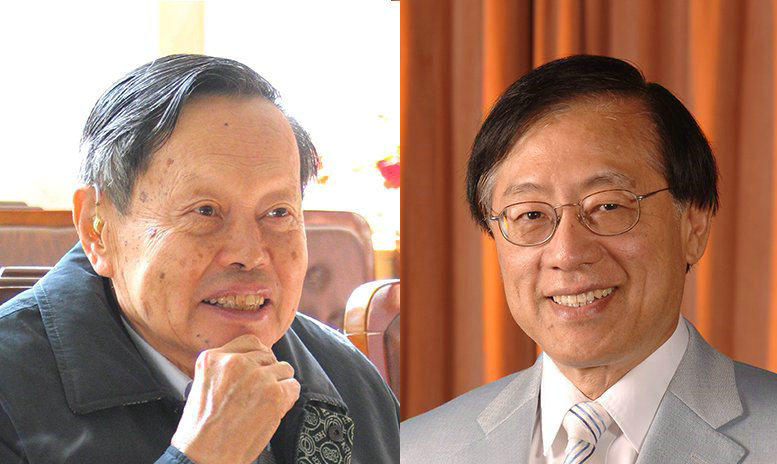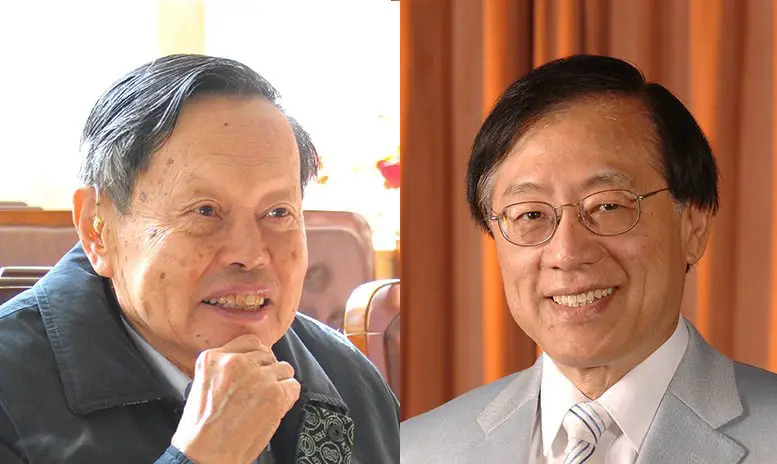By Huang Fahong from People’s Daily

Nobel laureate Chen Ning Yang and Turing Award-winning computer scientist Andrew Chi-Chih Yao have given up their foreign citizenship and become domestic academicians of Chinese Academy of Sciences (CAS).
The two scientists are the first domestic academicians that were inducted from foreign members in CAS’ history. The Chinese government also introduced an interim plan to cope with such situation.
Yang, born in China, went to the US for studies in 1945 and worked there after graduating from the University of Chicago. He received the 1957 Nobel Prize in Physics together with Tsung-dao Lee for their work on parity non-conservation of weak interaction, becoming the first Chinese scientist awarded with the honor. Yang became a US citizen in 1964.
Yao received the Turing Award, the most prestigious award in computer science, in 2000 for his achievements in the study of computer quantum information science.
The duo’s returns to the homeland were greeted by the Chinese republic, proving that China’s growing national strength and talent-introducing policies are attracting more elites back home.
The country has increased its investment in research and development (R&D) in recent years. Data showed that China spent 1.4 trillion yuan in R&D in 2015, second only to the US. The volume means a 38.1% increase compared with that in 2012, and an 11.4% annual growth, indicating that overseas Chinese talent will be braced with better market prospects and more capitals if they establish their careers back in China.
Zhang Ji, a Chinese returnee from Canada, can serve as another example. When returning to China in 2009, he brought back a heart valve implantation system. After a 30-minute presentation, Zhang received huge investment from some domestic investors as well as policy support from local government.
Only one third of overseas Chinese students chose to return to China back to 10 years ago, but now the proportion has been rising to 80 percent. The growth rate can be attributed to the country’s favorable policies to introduce talents.
Starting from 1990s, China has launched a series of programs to lure back talents. The “Thousand Talents Program”, one of those programs, offers attractive financial packages and generous funding to researchers returned to China.
Other programs included Changjiang (Yangtze River) Scholars Program, the highest academic award issued by the Ministry of Education, the “Hundred Talents Program”, a major project in CAS to recruit outstanding talents overseas, as well as the National Science Fund for Distinguished Young Scholars. Thanks to those efforts, more and more returned talents have helped push forward the development of new technologies and high-tech industries.
The two scientists are the first domestic academicians that were inducted from foreign members in CAS’ history. The Chinese government also introduced an interim plan to cope with such situation.
Yang, born in China, went to the US for studies in 1945 and worked there after graduating from the University of Chicago. He received the 1957 Nobel Prize in Physics together with Tsung-dao Lee for their work on parity non-conservation of weak interaction, becoming the first Chinese scientist awarded with the honor. Yang became a US citizen in 1964.
Yao received the Turing Award, the most prestigious award in computer science, in 2000 for his achievements in the study of computer quantum information science.
The duo’s returns to the homeland were greeted by the Chinese republic, proving that China’s growing national strength and talent-introducing policies are attracting more elites back home.
The country has increased its investment in research and development (R&D) in recent years. Data showed that China spent 1.4 trillion yuan in R&D in 2015, second only to the US. The volume means a 38.1% increase compared with that in 2012, and an 11.4% annual growth, indicating that overseas Chinese talent will be braced with better market prospects and more capitals if they establish their careers back in China.
Zhang Ji, a Chinese returnee from Canada, can serve as another example. When returning to China in 2009, he brought back a heart valve implantation system. After a 30-minute presentation, Zhang received huge investment from some domestic investors as well as policy support from local government.
Only one third of overseas Chinese students chose to return to China back to 10 years ago, but now the proportion has been rising to 80 percent. The growth rate can be attributed to the country’s favorable policies to introduce talents.
Starting from 1990s, China has launched a series of programs to lure back talents. The “Thousand Talents Program”, one of those programs, offers attractive financial packages and generous funding to researchers returned to China.
Other programs included Changjiang (Yangtze River) Scholars Program, the highest academic award issued by the Ministry of Education, the “Hundred Talents Program”, a major project in CAS to recruit outstanding talents overseas, as well as the National Science Fund for Distinguished Young Scholars. Thanks to those efforts, more and more returned talents have helped push forward the development of new technologies and high-tech industries.
 Menu
Menu
 Nobel laureate, Turing award winner become Chinese citizens
Nobel laureate, Turing award winner become Chinese citizens
















